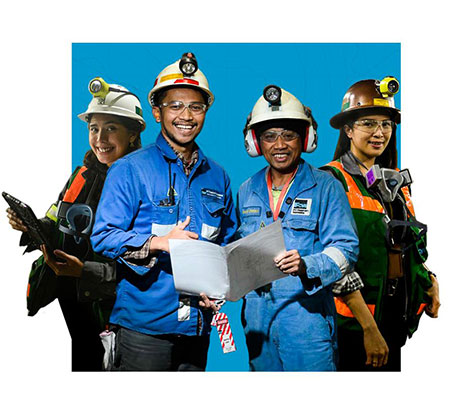Historically, mining is seen as a dangerous and hazardous undertaking. Identifying and managing physical threats in the mining process are key components of our safety and health program. By identifying these threats, every operation is allowed to conduct mitigation through engineered or administrative controlling, or through the use of personal protection gear.
Our approach is to conduct evaluations on an ongoing basis against any process or operation that might potentially pose a threat. Once a risk is identified, we take steps to measure its extent before controlling it trough proactive measures in order to protect the health of our workforce.
We are aware and concerned about the prevalence of HIV and AIDS, notably among community members in our contract of work site. The company is aware that HIV and AIDS are diseases that need correct medical attention and of the social aspects that are attached to this issue. HIV/AIDS educational activities have targeted employees through education centers at the workplace, the company’s closed-circuit television, and other media campaigns of the company.
Freeport Indonesia’s policy statement on HIV/AIDS acknowledges the important implications of HIV and AIDS on the workforce and on the local community and the company makes an effort to curb the transmission of the disease in accordance with regulations of the Government of Indonesia and recommendations of the World Health Organization (WHO), the International Labor Organization (ILO), U.S. Center for Disease Control and Prevention (CDC), and other relevant international health organizations. In line with the company’s policy of non-discrimination, government regulations concerning HIV and AIDS, and the view of ILO, Freeport Indonesia respects a non-discriminatory and equitable approach for people with HIV or AIDS. Freeport Indonesia has also carried out world-class cohesive malaria controlling programs, and has a coordinated approach to fight TB.
Kami menghimbau para pencari kerja untuk berhati-hati dan mewaspadai beragam modus penipuan perekrutan yang mengatasnamakan PT Freeport Indonesia. Dalam setiap proses rekrutmen dan penerimaan karyawan, PT Freeport Indonesia maupun konsultan rekruitmennya tidak memungut biaya apapun.
Untuk melihat lowongan, silakan akses melalui link berikut: ptfi e-recruitment
Untuk melihat informasi magang, silakan akses melalui link berikut: Internship Program
